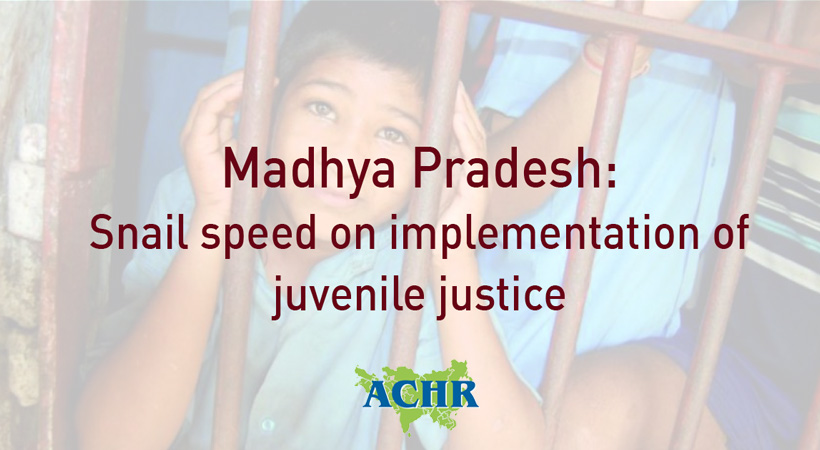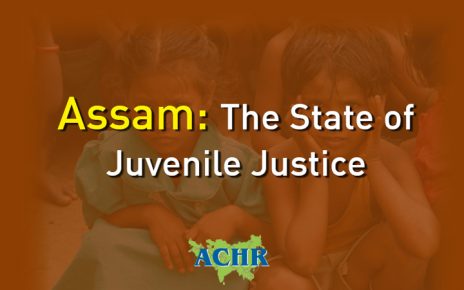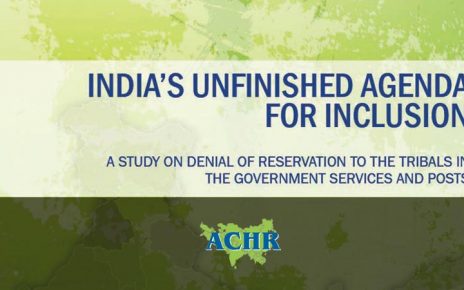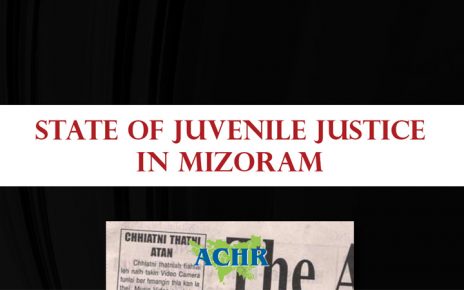Madhya Pradesh faces serious problems with juvenile delinquency. Among the states of India, Madhya Pradesh has been topping the list of “juvenile crimes” under the Indian Penal Code (IPC) from 2005 to 2011 except in 2009 during which it ranked second after Maharashtra. According to the National Crime Records Bureau (NCRB) under the Ministry of Home Affairs, during 2011, a total of 4,997 incidence of crime by juveniles were reported and 5,495 juveniles were apprehended. However, Madhya Pradesh has been excessively slow in the implementation of the Juvenile Justice (Care and Protection of Children) Act, 2000 [hereinafter referred to JJ(C&PC) Act].
There are numerous cases of juveniles being detained in police lock ups and prisons in clear violation of the JJ(C&PC) Act. During the field visits by Asian Centre for Human Rights (ACHR) to the Observation Homes in Bhopal on 6-7 March 2012 and Indore on 16-17 April 2012, many juveniles stated that while they were treated well once produced before the Juvenile Justice Boards (JJBs), many of them were subjected to torture and other inhuman and degrading treatment while in police custody.
The police remain unaware of the provisions of the JJ(C&PC) Act. In a letter dated 8 March 2010 the Madhya Pradesh government informed the National Commission for Protection of Child Rights (NCPCR) that Special Juvenile Police Units (SJPUs) have been set up in all the 50 districts of the state. In the same letter, Madhya Pradesh government also claimed that only 836 Juvenile or Child Welfare Officers were trained which implies that a maximum of 836 police stations had at least one trained Juvenile or Child Welfare Officer. However, as per the Bureau of Police Research and Development, there were 941 police stations in the State as on 1 January 2010 and this implies that about 105 police stations did not have either any Juvenile/Child Welfare Officer or trained Juvenile/Child Welfare Officers to handle the juveniles or children under the JJ(C&PC) Act. Further, the claim of Madhya Pradesh government has to be taken with a pinch of salt: according to news reports, Special Juvenile Police Unit was first launched in Madhya Pradesh as late as in November 2010.
Despite Madhya Pradesh consistently topping the list of “juvenile crimes”, there are no Observation Homes in 32 districts. At the same time, the State Government of Madhya Pradesh admitted during the 29th Project Approval Board (PAB) meeting of the Integrated Child Protection Scheme (ICPS) of the Ministry of Women and Child Development on 22 November 2011 that 15 out of the 18 Observation Homes were underutilised. Obviously rationalization for the use of the Observations Homes has not been taking place.
There are problems of over-crowding in the Special Homes for boys. The NCRB reported that during 2011, about 450 juveniles were sent to Special Homes. However, Madhya Pradesh has only three Special Homes with a total sanction capacity of 200 juveniles. The Government of Madhya Pradesh despite increase in juvenile crimes has not built any new Special Home since 1988. The Govt. Special Home, Seoni was built on 26 December 1988 while the Govt. Special Home for Boys, Indore was built in 1972 and the Govt. Special Home for Girls, Indore was built in 1971. In the absence of adequate number of Special Homes it is suspected that juveniles found guilty by the JJBs are sent to Observation Homes and Children’s Homes.
The problem is further compounded by the fact that children in need of care and protection and juveniles in conflict with law but not found guilty by the JJBs have been sent to Special Homes. The PAB of the Ministry of Women and Child Development noted that “The State should ensure that only those children who are found guilty by JJBs after enquiry should be sent to Special Home and children in need of care and protection should not be kept in these Homes.”
There are significant problems with the administration of juvenile justice. The Project Approval Board, Ministry of Women & Child Development during its 51st meeting held on 18 September 2012 noted that there were 14000 cases pending disposal in the JJBs. What is more alarming is that an average of more than 2,000 cases remain pending disposal every year as per the NCRB. There was no sign of reduction of pending cases. According to the NCRB, there was an increase of pending cases during 2011 over the previous year. At the end of 2011, 2170 cases were pending disposal at various JJBs in the state, while 2033 cases were pending disposal during 2010. Yet, the JJBs sit only two days in a week and there seems to be no urgency to increase the number of sittings or conduct special sittings. The State government even failed to encourage the JJB members by its failure to pay Rs 500/- per sitting and travel allowances as required under the Madhya Pradesh Juvenile Justice Rules, 2003 (amended in 2008). The State government reportedly provides only Rs 120 per sitting to each JJB member. Further, the Probation Officers who conduct the investigation on which basis the JJBs decide the cases, are not trained in child rights.
On 22 November 2011, the state government informed during the PAB meeting that many of the 70 Child Care Institutes (CCIs) identified in the state were functioning without registration.10 Given that many of the CCIs were functioning without registration it becomes important to conduct inspections at regular intervals which is not the case.
Though Child Welfare Committees have been constituted in all the 50 districts of the state, many CWC members do not attend the meetings at all. In addition, proper procedures were not followed by the CWCs. On 22 November 2011, the state informed during the PAB meeting that a CWC had given one child in foster care without following due procedure. The CWCs are sitting for only two days in a week i.e. 8 sittings in a month while the Integrated Child Protection Scheme provides for 12 sitting per month to perform other functions such as inspections, follow up of individual care plans etc.
Asian Centre for Human Rights recommends the followings to the State Government of Madhya Pradesh and the Ministry of Women and Child Development, Government of India:
- Instruct the JJBs and Child Welfare Committees and the Superintendents of the Observation Homes, Special Homes and Children’s Home to inquire as to whether any child taken into custody have been subjected to violations of the Juvenile Justice (Care and Protection of Children Act), 2000;
- Increase the number of Special Homes to -reduce over-crowding and ensure that juveniles found guilty by the Juvenile Justice Boards are not sent to the Observation Homes and Children’s Home;
- Rationalise the number of Observation Homes in term of capacity and manpower and to use cluster approach for Homes;
- Increase the number of sittings, inspections and inquiries by the Child Welfare Committees;
- Remove members of the Child Welfare Committees who do not attend two meetings consecutively without prior notice providing valid reasons;
- Reduce pendency of cases by increasing sitting of the Juvenile Justice Boards;
- Fill up the post of all members of the JJBs and provide sitting and travel allowances as per the Madhya Pradesh Juvenile Justice Rules 2003 (amended in 2008);
- Increase and constitute Observation Homes in the rest 32 districts where they have not been established as yet;
- Take necessary measures against Children’s Homes not registered with the State Government;
- Designate police officers as “Juvenile or Child Welfare Officers” in every police station who shall be members of the Special Juvenile Police Units and train them; and
- Provide training for all members of JJBs and the Probation Officers in the state.




